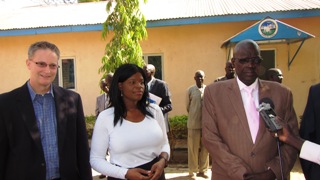South Sudan’s Jonglei to form assets division committee per new presidential states
October 9, 2015 (BOR) – Jonglei state in South Sudan has announced to form a committee that will redistribute government’s assets to the newly created states per the unilateral order issued by president Salva Kiir, which dismantled the state and created three states from it, including elevating Pibor administrative area to a new Buma state.

Following the directives from the president, caretaker governor of Jonglei state, John Kong Nyuon, on Friday briefed his state government on the need to form a committee to conduct the redistribution of the assets among Western Bieh, Eastern Bieh and Jonglei state.
The state-owned property that are subject for division would include unnamed assets of movable status, such as cars, but the new states will have struggle to get their state buildings and accommodations, etc.
According to Kong, the administrative order of the president was a response to the popular call by the people and vision of the SPLM founder, John Garang on developing the rural communities, adding that the degree would not affect peace negatively, calling on the international community and the citizens of South Sudan to respect it.
“The presidential decree has no impact on compromised peace agreement signed. It does not negatively affect the constitution of the Republic of South Sudan whatsoever. We have to respect the order and comply with it as government policy,” Kong told the gathering on Friday.
“The rebels wanted 21 states, if the 21 states have been supplemented with 7 more, how does it affect the implementation of compromised peace deal,” he wondered.
The order shall be taken to the national assembly for discussion within 30 days from the date of announcement, prior to final endorsement. The issues that would be dictated by the formation of the new state, he said, includes border disputes, but added that the government will form border dispute resolution committee (SBDRC).
“State border dispute resolution committee will be formed to lead the implementation of presidential order. The problem of names, boundaries and transfer of some communities to other administrative areas will be amended by the State border dispute resolution committee,” continued the governor.
“There are some state names and boundaries that will be changed by this committee,” he said.
In case of any dispute, according to the governor, the SBDRC, shall investigate and report its finding through the president to the council of states for final decision to be made. The council of states will make final amendment of state boundaries, names and flags for endorsement.
The old states’ parliamentarians before December 2013 crisis shall be members of parliament in their own respective states and their new state assemblies would comprise of 21 members. The current members of parliament in numbers are less than 21, the president shall appoint more to fill the gaps, explained Kong.
Governor Kong accused the international community for not actively participating to settle the Abyei disputed area, one of the supposedly states to be included in the list of new states, further claiming that the new states would “attract, encourage and mobilize national experts to work at the state and county levels and promote social and economic development in the rural communities.”
“The flag, emblem, seal, festivals and commemoration of each state shall be prescribed by the state legislatures,” he said.
However, South Sudanese opposition parties, former detainees, civil society organizations and the international community at large condemned the order by president Kiir, saying he violated both the constitution and the peace deal and called on him to suspend the decision and follow the mechanisms towards federalism which are provided for in the accord.
Article 162 in the South Sudan Transitional Constitution, 2011, prohibits that “the President shall not make any provisional order on matters affecting the Bill of Rights, the decentralized system of government, general elections, annual allocation of resources and financial revenue, penal legislation or alteration of administrative boundaries of the States.”
It also stipulates that the territory of the Republic of South Sudan is composed of 10 states. The constitution only provided for the Council of States to legislate laws that may alter the number of states, change their names and of their capitals or alter boundaries in accordance with initiative from the state concerned.
Despite the calls to suspend the decision, the government however maintained that it would continue with the implementation of the decree, saying the decision neither violated the country’s transitional constitution nor the peace deal.
Observers with knowledge in the South Sudanese peace process say the sudden U-turn by the government from rejecting the creation of more states during the peace talks to accepting it after the peace agreement has been signed could merely be based on the desire to claim credit for the creation of the federal states.
(ST)
